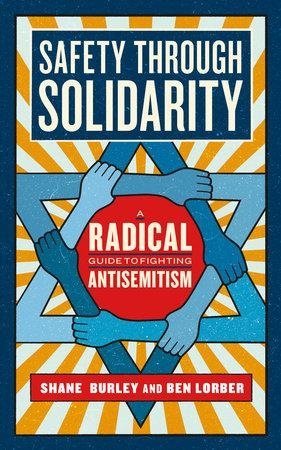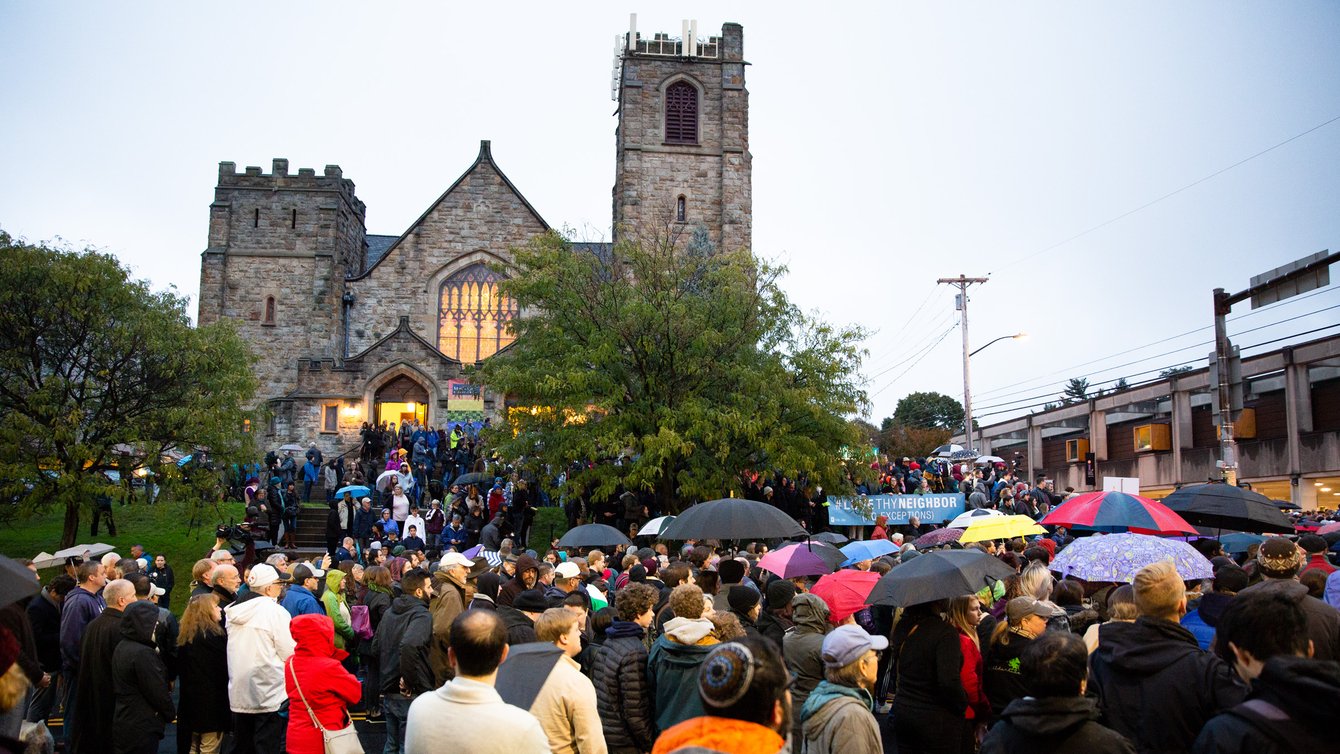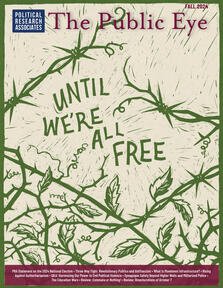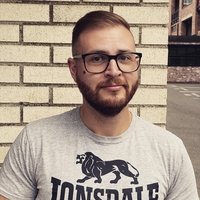Safety Through Solidarity takes the fight against A form of oppression targeting Jews and those perceived to be Jewish, including bigoted speech, violent acts, and discriminatory policy. Learn more out of the hands of status quo defenders and into the hands of social movements. In this excerpt, Lorber and Burley unpack how racialization shapes experiences of Jewish safety in the United States, and report on how activists are building intersectional solidarity and community safety teams to protect one another from violence. Using history, analysis, and interviews with frontline organizers, it situates the fight against antisemitism where it belongs: alongside the fight against all forms of The use of violence, intimidation, surveillance, and discrimination, particularly by the state and/or its civilian allies, to control populations or particular sections of a population. Learn more . With White The contemporary idea that America was founded as—and was intended by God to be—a Christian nation. Learn more on the rise, Israel’s horrific genocidal siege of Gaza, social justice organizers facing Repression occurs when public or private institutions—such as law enforcement agencies or vigilante groups—use arrest, physical coercion, or violence to subjugate a specific group. Learn more , and conversations around antisemitism more polarized than ever, it’s never felt more important to change the narrative on what antisemitism is and what it isn’t, and to strengthen our movements for collective liberation.
This excerpt has been adapted and edited for brevity and clarity.

Safety Through Solidarity: A Radical Guide to Fighting Antisemitism (Melville House, 2024)
Excerpted from Safety Through Solidarity: A Radical Guide to Fighting Antisemitism (Melville House, 2024), 310–316. Used with permission of the publisher, Melville House Publishing. Copyright © 2024 by Shane Burley and Ben Lorber.
When the Tree of Life synagogue shooting happened in Pittsburgh in October 2018, “a lot of Jews were scared and panicked,” Hannah Freedman, an organizer and member of Kavod, an independent collective of young Jews in Boston, told us. In Kavod’s first Shabbat service after the shooting, hundreds of Jews gathered inside, while over twenty non-Jewish community safety volunteers kept watch outside the building. “It was very scary to gather as Jews at that time,” Alyssa Rubin, another Kavod member, recalls. “I felt moved to tears by seeing that many allies outside.”
Activists across the country are developing alternative models to defend protests, religious centers, and other marginalized community spaces from bigoted violence without relying on racist policing or the national security state apparatus. In moments of heightened antisemitic violence, establishment Jewish institutions typically advocate for increased police and private security at synagogues and Jewish spaces. When the 2020 George Floyd uprising began, Chava Shervington, a Black Orthodox Jewish woman, remembered seeing warnings on her WhatsApp thread that presented the protests as threatening, and some would suggest that they “go thank every police officer” in response. There was often a distance that white Jews in her community had from issues of police violence because they had moved through the world without having to experience the racist victimization by law enforcement that many Black people have experienced.
“Even for white Jews, police are not inherently a source of safety. Many police themselves are part of or sympathize with antisemitic radical Right groups.”
“It’s a reflection on the fact that in America [white] Jews and Black people have had very different experiences of safety and community at the hands of the police,” Shervington told us. “So when [white] Jewish communities feel harm they rely on policing and other forms of armed security, which makes me feel less safe, makes my family feel less safe.” But there is a “different level of fear that Black Jews … [are] walking around with,” Shervington continued. “There’s always a lack of safety in my personhood because I’m a Black person in America.” This reality has driven a core resiliency: a determination to survive and thrive despite the threats. [S]he cofounded Kamochah, which supports Black Orthodox Jews [to] advocate for diversity in yeshivot (Jewish religious schools) and prepares Orthodox communities to interrupt An ideology that assumes a hierarchy of human worth based on the social construction of racial difference. Racism as an ideology claims superiority of the socially constructed category, White, over other racialized categories based on the false idea that race is a fixed and immutable reality. Learn more .
The federal security grants championed by communal leaders can also undercut the principled, intersectional approach to fighting antisemitism we need. Many federal funding initiatives designed to provide faith groups with access to these resources, such as the Nonprofit Security Grants or Countering Violent Extremism (CVE) programs, have long been used “to increase state surveillance of Muslim organizations under the guise of protecting them,” as Jewish Currents reporter Mari Cohen said in 2021. Some programs mandate collaboration and intelligence sharing with law enforcement, while others work closely with federal agencies like the Department of Homeland Security known for biased surveillance against Muslims, detaining and deporting migrants at the border, and crackdowns on Leftists. For organizations like the Council on American-Islamic Relations (CAIR) and the Boston-based Muslim Justice League, the “counterterrorism” frame underlying these initiatives plays on long-standing Islamophobic post-9/11 narratives.
Moreover, even for white Jews, police are not inherently a source of safety. Many police themselves are part of or sympathize with antisemitic radical Right groups. A 2020 report by Michael German of the Brennan Center for Justice calculated that since 2000, law enforcement officials in at least fourteen states have been outed as members or supporters of groups like the A U.S.-based White supremacist, Christian paramilitary group formed during the Reconstruction era. Learn more , Proud Boys, Oath Keepers, and militias.
“Dozens of synagogues and Jewish centers across the United States use community safety models as a values-based approach to fighting antisemitism with solidarity, while also supporting local or national abolitionist campaigns.”
After Unite the Right, Kavod organized and trained a community safety team of mostly non-Jewish volunteers from local movement groups to guard their services. “In Appalachia, the South, we have a long lineage of both abolition and opposition to the Klan, the cops, and the state,” Shawn Fischer, a non-Jewish member of SURJ’s Faith Committee who helps run these trainings, told us. “And I think that’s really important for me to understand that I’m part of this much longer tradition.”
Community solidarity after the Pittsburgh shooting, Freedman told us, “was a big turning point for people to believe that we could be doing this work, and that folks could be showing up for us.” In the years since, Kavod built an active community safety team, working with partners to anticipate possible threats, build safety plans, deploy dozens of volunteers, and collaborate with groups like Jews for Racial and Economic Justice (JFREJ) and Jewish Voice for Peace doing similar work across the country. Dozens of synagogues and Jewish centers across the United States use community safety models as a values-based approach to fighting antisemitism with solidarity, while also supporting local or national abolitionist campaigns.
“I think we on the Left are at the very beginning of figuring out our approach to threats to Jewish spaces,” Jewish scholar and activist April Rosenblum told us. [She added],
Most Jews in the US don’t know what it’s like to live with violent A form of top-down political system that concentrates state power in the hands of a single leader and/or group of close allies. Learn more . We’re just beginning to grapple with how to protect ourselves in a time like this … I think for many US Jews, who grew up with relative privilege and safety, there is a comfort in sticking to abstract ethical ideals. We want to express our liberatory and abolitionist principles by focusing on having open doors and broad networks of solidarity. And that solidarity is essential. It’s the only way forward for the long term. But we have to also have a plan for the short term. We have to figure out concrete ways of actually preventing attacks in our spaces, while also protecting and prioritizing Jews and allies who would be made unsafe by the mainstream methods of policing and surveillance that we are trying to undo … It will take creativity to figure out how we can really block physical attacks on our community in a liberatory way. But when we figure it out, I think we’ll gain a lot of momentum and we’ll see many more people start to join us in our larger vision.



